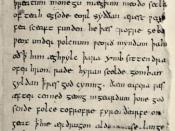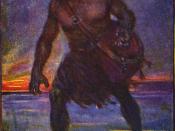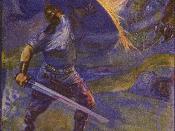The epic tale of Beowulf involves an ethical battle between good and evil. The story deals with Beowulf, an epic hero that has super physical strength. Beowulf was written in England sometime in the 18th century. "This provides us with an idea of a poem that was written during a time when the society had converted from paganism to Christianity"(Cohen 138). "We know that paganism did exist alongside Christianity during the approximate era that Beowulf was composed"(Hall 61). In the epic tale of Beowulf, one of the greatest battles faced is the struggle between pagan idealism and Christian ethics.
In the epic tale of Beowulf, the characters display numerous amounts of Christian elements. Although Beowulf is a prime example of a fierce warrior that slays hundreds of foul creatures, he still renders good morals by being a supernatural hero. Beowulf takes it upon himself to save the Danes from Grendel and chooses not to use weapon proves that he is a superhero with good Christian morals.
For instance, in the book, Beowulf's author clearly attributes the word wyrd, which means God's fate for you. God's fate for Beowulf was to defend the good and fight evil. Another example of Christian elements in Beowulf is when Grendel's mother seeking revenge for Beowulf's acts against Grendel. In this situation, Grendel's mother seeks revenge based on the love she had for her son. Beowulf is in battle with Grendel's mother in her dark layer to seek revenge for her beloved son's death. Furthermore, the preeminent display of Christian ethics involves the warrior code. "The warrior code, which is apparent throughout Beowulf, is based on values that seem to conflict, in some ways, with Christian values" (Internet source). For example, the warrior Wiglaf stays behind to help crippled Beowulf fight the dragon. To...


